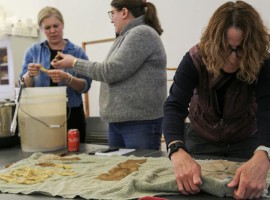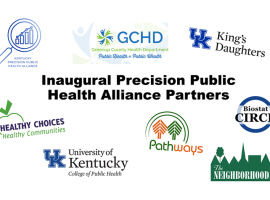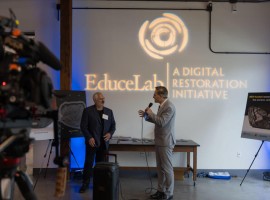NIH Awards $11.2 Million for Pharmaceutical Research and Innovation Center at UK

The University of Kentucky was recently awarded a prestigious Centers of Biomedical Research Excellence (COBRE) grant to study translational chemical biology from the National Institutes of General Medical Sciences, part of the National Institutes of Health. The $11.2 million grant will fund UK's Center of Biomedical Research Excellence in Pharmaceutical Research and Innovation (CPRI).
Jon Thorson, a professor in the College of Pharmacy Department of Pharmaceutical Sciences, and the principal investigator on this grant, serves as CPRI director. Thorson said the COBRE theme in translational chemical biology is “the nexus of chemical biology (the application of chemical biology principles to develop validated models to advance our understanding of biology) and pharmaceutical science (the application of pharmaceutical principles to advance materials and devices that address unmet clinical needs).”
"Our outstanding researchers at the University of Kentucky are leading the way in translational chemical biology, and the recently awarded COBRE grant is a testament to UK CPRI’s success in their constant pursuit of discovery," said UK President Eli Capilouto. "As Kentucky’s land-grant institution, we have a profound responsibility to serve and care for the Commonwealth. Because of the CPRI’s exceptional work, we can continue to find cutting-edge solutions to the problems that challenge Kentuckians the most.”
“We have benefited greatly by the NIH COBRE program, which has had an immense impact on the research infrastructure and support of junior investigators within a targeted theme,” said Lisa Cassis, UK Vice President for Research. “The CPRI NIH COBRE is well-positioned to augment the lead discovery and development objectives of many of UK’s outstanding translational research centers focused on disproportionate health challenges in the Commonwealth, continuing our legacy of these high-impact programs at UK.”
This new COBRE funding leverages an impactful College of Pharmacy center launched as CPRI in 2012, in partnership with the UK Center for Clinical and Translational Science, Markey Cancer Center and the Office of the Vice President for Research.
“CPRI has increased UK’s access to compound libraries, molecular modeling, virtual screening, assays, and other resources to ensure UK remains a leader in scientific discovery,” said Kip Guy, Dean of the UK College of Pharmacy. “Receiving the COBRE grant further demonstrates UK College of Pharmacy’s commitment to cutting-edge interdisciplinary and interprofessional science. With all of our colleges sharing one campus, we’re uniquely positioned to collaborate across the spectrum, ensuring our research stays relevant to the needs of Kentuckians.”
This COBRE Phase 1 funding will provide new campus-wide junior faculty research and career development support, core infrastructure and pilot grants in the translational chemical biology research space. Critical infrastructure, in the form of cores, will support advanced research across UK campus: Chang-Guo Zhan directs the computational core; Mark Leggas directs the translational core; Linda Dwoskin directs the pilot program; David Watt directs the synthesis core (first developed under a previous COBRE grant for the Center for Molecular Medicine); and Tonya Vance coordinates the administrative core.
“This COBRE is an incredible incubator for scientific cross-cultivation and disruptive innovation — an outstanding set of fearless junior PIs with scientific training in diverse disciplines unified by their shared interests in the development, application and potential translation of novel molecular probes and tools,” said Thorson.
Four early-stage investigators, mentored by teams of clinicians and scientists from a variety of disciplines, departments and colleges at UK, will lead major research projects.
“Gold-based pharmacophore synthetic strategies as a basis for transcription factor modulator discovery” led by Samuel G. Awuah in chemistry, College of Arts & Sciences
“We believe that designing gold compounds with strong affinity for c-Myc oncoprotein will be a game-changer and provide significant potential to resolving a long-standing problem in chemical biology and biomedicine. Dysregulation of this protein is implicated in roughly 50% of cancers, particularly in leukemia, colon, medulloblastoma, and breast cancers,” said Awuah.
“Quantitative Mechanical Phenotyping of Bacterial Biofilms on Implant Surfaces” led by Martha Grady in mechanical engineering, College of Engineering
“Complications from implant-related infections can lead to endocarditis, amputations or even death. The results and tools developed here – new approaches to combat biofilm accumulation through advanced multi-scale characterization techniques – will guide us to better understand the influence of biofilm mechanics on the genesis of infections,” Grady said.
“Chemical Biology of Microbial Type IV Secretion Systems” led by Carrie Shaffer in veterinary science, Gluck Equine Research Center
“We use advanced microscopy, chemical biology, genetic and biochemical approaches to understand how bacteria engineer and build complex nanomachines that transport diverse microbial cargo to target cells. This funding will allow us to develop novel chemical tools to understand how microbial machines are assembled and find new strategies to combat infectious disease,” said Shaffer.
“Understanding the role of anti-apolipoprotein A-I antibodies in atherosclerotic cardiovascular disease” led by Vincent Venditto in pharmaceutical sciences, College of Pharmacy
“My work focuses on understanding the role of the immune system in heart disease. By developing new tools and techniques to study disease progression, we hope to identify new drug targets and therapies to reduce the burden of heart disease,” Venditto said.
“An exceptional team of young investigators, mentors, core leaders, advisors and proposal development experts made this possible,” Thorson said. “We expect our COBRE to bring new technologies and ways of thinking into the conventional field of pharmaceutical science and expose a broader range of basic and clinical researchers to pharmaceutical science fundamentals.”





